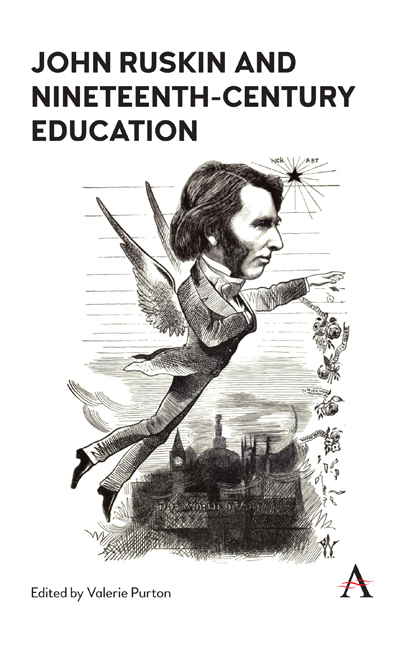Introduction
Published online by Cambridge University Press: 25 July 2018
Summary
John Ruskin, whose bicentenary is celebrated in 2019, was an art historian, cultural critic and political theorist who was also, and perhaps most importantly, a great educator. Ruskin was the inspiration behind such influential figures as William Morris, Leo Tolstoy, Marcel Proust and Mahatma Gandhi, and his influence can be felt in many spheres of education today, for example in debates about the importance of creativity, about grammar schools and social mobility, about further education, the crucial social role of libraries, environmental issues, the role of crafts as well as academic learning, the importance of fantasy literature and the education of women. The present collection brings together ten international Ruskin scholars to explore what he actually said about education in his many- faceted writings. The varied approaches taken by the writers suggest that, as Francis O'Gorman writes in his Foreword, ‘There is no obligation for Ruskin's readers to agree with him’. The tones of the chapters shift between the celebratory and the astringent, as the writers assess from very different perspectives the nature of their subject's achievements. The essays are grouped for convenience under three headings: Section A: Changing the World; Section B: Libraries and the Arts; and Section C: Christianity and Apocalypse. These headings alone suggest the astonishing breadth of Ruskin's engagement with his own society and with the wider world. The book is dedicated to Dinah Birch, a much- loved Victorian specialist and authority on Ruskin, whose work has helped make John Ruskin a fresh and significant presence in the twenty- first century.
The Cambridge Inaugural Address
In 1858 a school of art was set up in Sidney Street, Cambridge. Its aim, according to a contemporary poster preserved in the Anglia Ruskin University Library, was ‘to teach the citizens of Cambridge to apply practical skills with a sense of beauty’, and John Ruskin, then in his late thirties, was invited to give the Inaugural Address on 29 October. Already renowned as a critic of art and architecture, author of The Seven Lamps of Architecture and The Stones of Venice, Ruskin had also, since October 1854, been teaching at the newly opened Working Men's College in London.
- Type
- Chapter
- Information
- John Ruskin and Nineteenth-Century Education , pp. 1 - 10Publisher: Anthem PressPrint publication year: 2018

